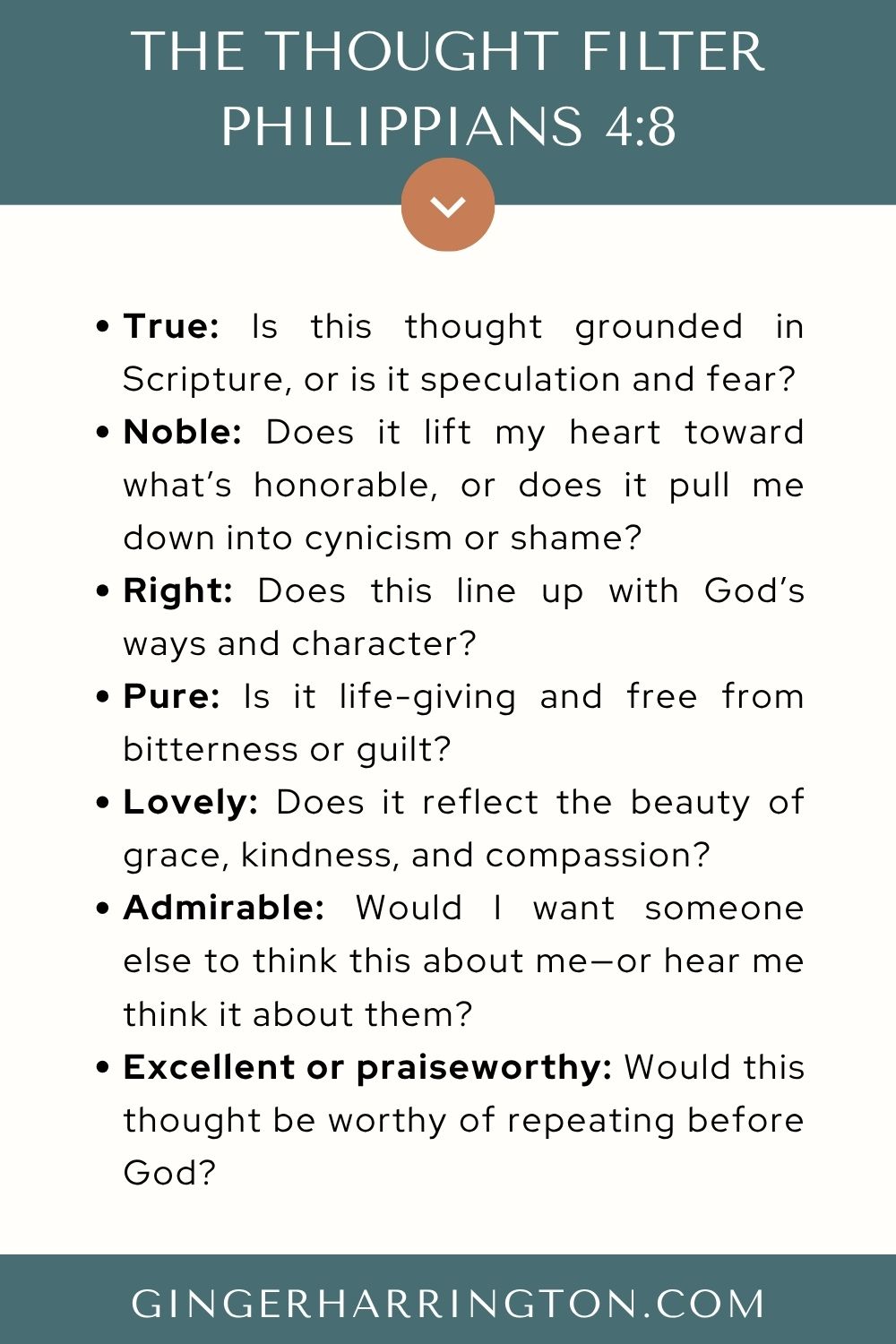Discover the meaning of Philippians 4:8-9 and learn how these verses create a biblical thought filter that replaces anxiety and negative thoughts with truth to experience the peace of God.
When Your Mind Starts to Spiral with Negative Thoughts
Have you ever noticed how one anxious thought can pull you down before you even realize it? You wake up feeling fine, but one “what if” sneaks in—and suddenly your heart is racing and your peace is gone.
If you’ve ever wondered how to stop negative thoughts before they steal your peace, Philippians 4:8–9 gives us God’s plan for emotional steadiness. Many of us wrestle with: what does Philippians 4:8 really mean, and how can it help us find the peace of God when our thoughts start to spiral?
In this article, we’ll walk through Paul’s teaching in Philippians 4:8–9 and discover how right thinking and daily practice help us live steady in the peace of God. You’ll learn:
- What Philippians 4:8 really means about renewing your mind — how each word in Paul’s list becomes a spiritual filter for your thought life to stop negative thinking.
- How to guard your mind like a doorkeeper — practical wisdom from Holy in the Moment to help you shut the door on lies, fear, and shame.
- How discernment helps you recognize the source of your thoughts — learning to tell the difference between the voice of the Spirit, the flesh, and the enemy.
- Why peace is a practice, not a feeling — what Philippians 4:9 teaches about living what you believe.
- How progress, not perfection, shapes a steady heart — encouragement for when negative thoughts return.
- Practical ways to put truth into action — simple rhythms to help you replace anxiety with peace one thought at a time.
That’s what makes this passage in Philippians so powerful. It’s not just poetic encouragement—it’s God’s practical plan for emotional steadiness.
“Finally, brothers and sisters, whatever is true, whatever is noble, whatever is right, whatever is pure, whatever is lovely, whatever is admirable—if anything is excellent or praiseworthy—think about such things.”
— Philippians 4:8 (NIV)
Paul gives us a spiritual strategy for renewing our minds—a way to filter the noise of anxious thinking through the lens of truth.
This verse is also a reminder that mental discipleship is part of spiritual growth. Learning to think in alignment with God’s truth is not automatic; it’s a practice of the will. Just as we train our hearts to trust and our hands to serve, we also train our minds to dwell on what is good and true.
When we talk about “renewing your mind,” we’re really talking about discipling your thoughts—bringing them under the influence of Christ so that peace becomes the natural byproduct of faith.
Peace begins where your thoughts embrace truth.

What Philippians 4:8 Really Means for Everyday Life
This isn’t just “think positive” advice—it’s spiritual training for anyone learning how to stop negative thoughts with Scripture and replace them with truth.
The Greek word logizomai (“think”) means to dwell on, to meditate on with purpose. It’s the same root used for calculating or reasoning—meaning this isn’t passive reflection. It’s an active, ongoing decision about what we allow to shape our thoughts.
That’s the essence of mental discipleship: we train our minds to align with truth the same way we train our bodies for strength or our spirits for faith. It’s not something that happens once—it’s a practice that grows through repetition and awareness.
We can’t always control what thoughts show up, but we can choose which ones get to stay. That’s the invitation of Philippians 4:8—to decide your mental focus instead of drifting wherever anxiety or distraction leads you.
During our recording, Larissa said something that stuck with me:
“It’s amazing how quickly we can go from calm to chaos—all inside our own heads.”
She’s right. And yet God hasn’t left us powerless. Through this verse, He gives us a blueprint for forming a truth-based thought life—one that aligns with His peace instead of our fears.
When we choose to think differently, we begin to live differently. It’s a slow transformation, but over time, our emotional reactions start to mirror the stability of God’s Word rather than the volatility of our emotions.
How the “Thought Filter” of Philippians 4:8 Works
Once we begin to see our thought life as part of discipleship, Paul’s list in Philippians 4:8 becomes more than beautiful language—it becomes a practical filter for the peace of God.
These eight words aren’t just moral virtues; they’re spiritual checkpoints that help us evaluate what deserves space in our minds.
When a thought enters, we can hold it up to these standards and ask whether it aligns with God’s truth:
- True: Is this thought grounded in Scripture, or is it speculation and fear?
- Noble: Does it lift my heart toward what’s honorable, or does it pull me down into cynicism or shame?
- Right: Does this line up with God’s ways and character?
- Pure: Is it life-giving and free from bitterness or guilt?
- Lovely: Does it reflect the beauty of grace, kindness, and compassion?
- Admirable: Would I want someone else to think this about me—or hear me think it about them?
- Excellent or praiseworthy: Would this thought be worthy of repeating before God?
Larissa calls this “the thought filter,” and I love that. Because sometimes your thoughts don’t need need direction.
When you use this filter regularly, you’re creating a habit of peace. You’re teaching your mind to recognize the difference between thoughts that bring life and those that drain it. It’s a quiet form of spiritual strength that shapes both your inner calm and your outer responses.
The thoughts you feed become the feelings you follow.

Learning to Be the Doorkeeper of Your Thoughts
This truth reminded me of something I wrote in Holy in the Moment (chapter nine, Moments to Think) called “Shut the Door of Your Mind to Unwanted Thoughts.”
Your mind is the door to your soul—and you are the doorkeeper. Though there are many things in life you can’t control, God has given you the ability to open and shut that door. You get to choose what you will dwell on.
Imagine you’re home and there’s a knock at the door. You answer it, and a stranger says,
“You’re worthless. You’ll never amount to anything. You should quit now before you make a bigger fool of yourself.”
Would you invite that person in for coffee? Of course not! You’d shut the door.
And yet this kind of conversation plays out in our minds every day when we let shame, fear, and self-criticism speak unchecked.
This simple picture shows us how to stop negative thoughts before they take root—by closing the mental door to lies and opening it only to what is true, right, and good. That’s the heart of Philippians 4:8—learning to choose what stays, what goes, and what we let shape us.
Sometimes I’ll even pray out loud: “Lord Jesus, help me shut the door to this thought. It keeps coming back, and I don’t want to entertain it. This isn’t from You.”
It’s a simple act of spiritual discernment. When you recognize that a thought doesn’t reflect God’s truth, you can refuse it entry.
Larissa put it this way:
“This door image makes the thought filter so practical. You don’t have to chase down every thought—you just decide which ones get through the door.”
Over time, this practice becomes a habit—a rhythm of hope that strengthens both your faith and your emotional well-being.
Learning Discernment at the Door
Recognizing what stands at the door of your mind is part of spiritual maturity and a steady heart. Every thought has a source—and not every voice deserves credibility.
- Some thoughts come from the Holy Spirit.
They are good, lovely, and consistent with God’s character. - Some come from the flesh.
They’re rooted in insecurity, habits, and past wounds. They whisper, “Why did you think you could do this?” - Some come from the enemy.
The accuser loves to disguise his lies in first-person language so they sound like our own thoughts.
That’s why it’s vital to pause and ask, “What is the source of this thought? Is this thought from my flesh, the Holy Spirit, or the enemy?”
Understanding God’s nature helps us test every thought against His Word and experience more frequent peace.
Discernment at the door of your mind keeps your soul steady.
A 2 A.M. Wake-Up Call: Practicing Peace When Fear Takes Over
A few weeks ago, I woke up at 2 a.m. with my mind racing. A new project was stretching me, and a flood of what-ifs poured in:
What if this doesn’t work? What if I’m not capable?
In minutes I had talked myself out of something God had clearly called me to do. Finally, I got out of bed, opened my Bible, and whispered,
“Would peace allow this thought in?”
The answer was clear—no. Those thoughts weren’t lovely, pure, or true; they were steeped in fear.
So I replaced them with the truth: God is my strength. He is working in me.
This is important because not every thought deserves a second thought.
That night reminded me—this practice is daily. It’s the work of faith done one thought at a time-especially when our emotions and fears begin to spiral.
Progress, Not Perfection
If you’ve ever caught yourself thinking, “Why am I still struggling with this?”—you’re not alone. Renewing your mind is a lifelong process.
We don’t graduate from having negative thoughts.
We live in a fallen world with a built-in negativity bias. The goal isn’t to eliminate every wrong thought—it’s to recognize and move past them faster.
Some days this looks like catching a spiral before it starts; other days it means realizing mid-spiral that you can still shift direction. Either way, every time you bring a thought back to truth, you’re exercising spiritual muscle memory.
That’s the beauty of this practice: it’s not about perfection—it’s about progress. Over time, your reflex changes. Instead of following fear down the familiar path of worry, your heart learns to return to peace more quickly.
So be patient with yourself. Philippians 4:8 isn’t a checklist to master; it’s a mindset to practice.
Each moment of awareness, each prayer for help, each decision to focus on what’s true and good becomes another step toward steadiness.
Perfection isn’t the goal—practice is.

Putting Philippians 4:8 into Practice: Simple Habits for Daily Peace
When your thoughts start to spiral, these three steps show how to stop negative thoughts in the moment and redirect your mind toward the peace of God:
- Pause and consider the source.
Ask yourself, Is this the Spirit, my flesh, or the enemy? Not every voice that enters your mind deserves your attention. - Filter the thought through Philippians 4:8.
Does it meet the test of truth, purity, and peace? If not, you have permission to close the door on it. - Replace it with Scripture.
Speak the opposite truth out loud or write it down. God’s Word reframes reality with what’s eternal and unchanging.
Here are a few examples:
- When fear says, “I can’t handle this,” respond, “The Lord is my strength and my shield.” (Psalm 28:7)
- When shame whispers, “I’ll never be enough,” answer, “God is still working in me.” (Philippians 1:6)
- When comparison bites, remember, “Nothing can separate me from God’s love.” (Romans 8:38–39)
Each replacement thought is a seed of truth. Plant enough of them, and peace begins to take root.
How Do We Practice What We’ve Learned? (Philippians 4:9)
Paul doesn’t stop at thinking—he calls us to practice.
“Whatever you have learned or received or heard from me or seen in me—put it into practice. And the God of peace will be with you.”
— Philippians 4:9
Right thinking leads to right living, and peace shows up in the doing—not just the believing.
When we take what we’ve learned and begin to live it, the God of peace doesn’t just guard our hearts—He goes with us. This is the heart of Habits of Hope: daily choices that shape a deeper life with God, one prayer, one thought, one practice at a time.
Every time you replace fear with prayer, lies with truth, or self-criticism with grace, you’re choosing peace on purpose.
Practice looks like:
- Paying attention to what enters your mind.
- Shutting the door on destructive thoughts.
- Rehearsing truth until it becomes your default.
- Extending the same grace to others that you receive from God.
Peace deepens through practice. It’s not perfection—it’s presence.
Peace grows stronger every time we live what we believe.
Why This Matters for a Steady Heart
This whole Steady Heart Series has been an invitation to live out the rhythms of Philippians 4:
Rejoice, pray, give thanks, receive peace, renew your mind, and practice what you’ve learned.
This is the heart of a steady life with Christ—and the heartbeat of Habits of Hope.
It’s not about pretending everything is fine; it’s about focusing on what honors God and letting His truth reshape the atmosphere of your thoughts.
When joy, prayer, gratitude, and truth work together, peace becomes more than a moment—it becomes your rhythm.
A steady heart is built one thought, one prayer, one truth at a time—and it’s strengthened by gratitude.
FAQ
We’ve covered a lot in this series, and Philippians 4:8–9 ties it all together. To help you put these truths into practice, here are a few frequently asked questions about what it means to renew your mind, guard your heart, and live with steady peace.
- What is the meaning of Philippians 4:8 and 4:9?
Together they form a guide for renewing your mind and living out God’s peace—testing your thoughts against truth and putting faith into practice. - How does this help with anxiety?
These verses redirect anxious thinking toward truth, helping you focus on God’s character instead of your fears. - Is this just positive thinking?
No. It’s truth-based thinking—anchoring your mind in what is real and right according to God’s Word.
Listen & Reflect
This article is based on Episode 57 of the Habits of Hope Podcast, part of the Steady Heart Series through Philippians 4. Listen to the full conversation with Ginger Harrington and Larissa Traquair to hear how to apply the Philippians 4:8 thought filter and practice the habits that grow peace. Listen to the full series below.
Want to Go Deeper in Learning to Guard Your Thoughts?
Discover simple, grace-filled ways to live moment by moment with God in Holy in the Moment by Ginger Harrington.
Learn how to overcome negative thinking, navigate anxiety and perfectionism, find peace in the present, and live with spiritual freedom. Get your copy of Holy in the Moment here.
The Steady Heart Series
- Part 1:How to Choose Joy in Hard Times: A Study of Philippians 4:4-5
- Part 2: How to Shift from Anxiety to Peace: A Study of Philippians 4:6
- Part 3: How to Find God’s Peace That Guards Your Heart: A Study of Philippians 4:7
- Part 4: How to Filter Your Thoughts and Find Peace: A Study of Philippians 4:8-9
About Ginger Harrington
Ginger Harrington is an author, speaker, and founder of the Habits of Hope Podcast and The Deeper Life Collection. A military wife and mom, she writes about spiritual growth and emotional well-being at GingerHarrington.com, where she helps women cultivate hope and a deeper life with Christ—for heart and home.
This post is for encouragement and inspirational purposes only. It reflects biblical insights and personal experiences related to faith and anxiety. It is not intended to diagnose, treat, or replace professional medical or mental health care. If you are struggling with anxiety or other mental health concerns, please seek support from a qualified counselor, physician, or mental health professional.
*This post contains affiliate links at no cost to you.



 So glad you're here. I help busy women—gals like you— build healthy habits for living well with biblical wisdom and practical steps to deepen your faith, increase your hope, and thrive in your purpose.
So glad you're here. I help busy women—gals like you— build healthy habits for living well with biblical wisdom and practical steps to deepen your faith, increase your hope, and thrive in your purpose.



